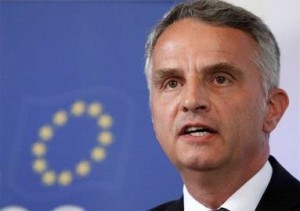Swiss Abandonment of Euro Peg Prompts International Concerns
After years of maintaining a 1.20 exchange rate between the Swiss franc and the euro, the Swiss National Bank (SNB) abandoned its attempt under pressure from the European Central Bank (ECB) as the latter is expected to begin a robust quantitative easing program. In 2011, Switzerland announced its intent to cap the exchange rate at 1.20 francs per euro, aiming to protect its massive export sectors against the dangers of currency appreciation. Economists feared that, had the SNB allowed the franc to appreciate to market levels, the relative increases of Swiss exports to European and other importers would hurt Swiss industry by making its products too expensive.
Over the past several years, the SNB has used francs to purchase foreign currencies including euros, pounds sterling, U.S. dollars, and Japanese yen. As a result, the SNB has more than doubled its foreign currency reserves and today is one of the five largest holders of foreign reserves worldwide. In its effort to keep the exchange rate cap in place, the SNB accumulated foreign reserves equal to nearly 85% of GDP, leaving it in a tenuous position as pressures mounted against the cap. Maintaining the cap despite looming quantitative easing by the ECB would have represented an incredibly difficult challenge, as a single country’s central bank would be trying to counter the effects of a policy undertaken by a much larger international central bank. The SNB would be forced to accumulate much larger foreign currency reserves, perhaps larger than it feasibly could without eroding confidence in its own abilities or in the stability of the franc.
However, choosing to abandon the exchange rate cap brought its own painful consequences. The announcement shocked the world currency markets, leading to what some called “carnage” in the exchanges. At one point, the franc-euro exchange rate fell to just 0.8052, though it has since stabilized at approximate parity with the euro. In the ensuing rebalancing of global exchange rates, the SNB’s foreign currency holdings were devalued significantly, with some estimates placing the damage as high as 13% of Swiss GDP (though considering that the bank had profited substantially from its foreign currency holdings – to the tune of nearly 34 billion francs – in its most recent report, perhaps it should count its blessings).
In justifying its decision (or perhaps trying to save face), the SNB explained its policy change as being motivated by a recognition that the U.S. dollar will now appreciate relative to the franc and perhaps stimulate export growth to the United States and India. Whether or not this effect balances out the losses from exports to Europe or the devaluation of currency holdings won’t be seen for several years.
In the relative stability that has come in the wake of the decision, questions linger as to how effectively a single nation can maintain its position with respect to monetary policy when a regional collective such as the Eurozone can exert so much power over it. Switzerland’s central bank couldn’t possibly maintain its desired exchange rate in the face of bond purchases and quantitative easing by the ECB, resulting in significant losses both for the SNB and for the Swiss economy. Swiss exporters are left to overcome sudden appreciation and the newly-accompanying unattractiveness of their products’ prices to foreigners.
For European central bankers outside the Eurozone, this may serve as a wakeup call warning of the dangers of attempting to forge economic policy independently of the ECB. The enormous power differential between the ECB and any individual European state’s central bank prevents the kind of nationally-focused decision-making that states might prefer and forces individual central banks to form their strategies around ECB actions.
Rather than attempting to maintain its favorable export situation through monetary policy alone, perhaps Switzerland could have foreseen ECB attempts to stimulate the rest of Europe through a quantitative easing scheme and used other policy tools to protect its export industry before this crisis could transpire. Instead, its total abandonment of the pegged rate signals the SNB’s defeat and an inability to control the country’s own monetary policy despite assurances as recently as December 18 that it would “defend [the cap] with utmost determination.” In the eyes of many experts, including Nobel Prize-winning economist Paul Krugman, the SNB has “thrown away its credibility” by giving up on maintaining the peg at the first sign of quantitative easing. As a result of its failed attempt to protect Swiss exports through aggressive monetary policy, the SNB will face a much more difficult time reassuring investors and businesses going forward.
As Jeremy Cook, the chief economist at international payments company World First, remarked, “Nobody wins when you stand in the way of a freight train, except for the train.” Perhaps the SNB and other non-Eurozone central banks can find a way to get on the ECB-led train and then strategize for better seats.

